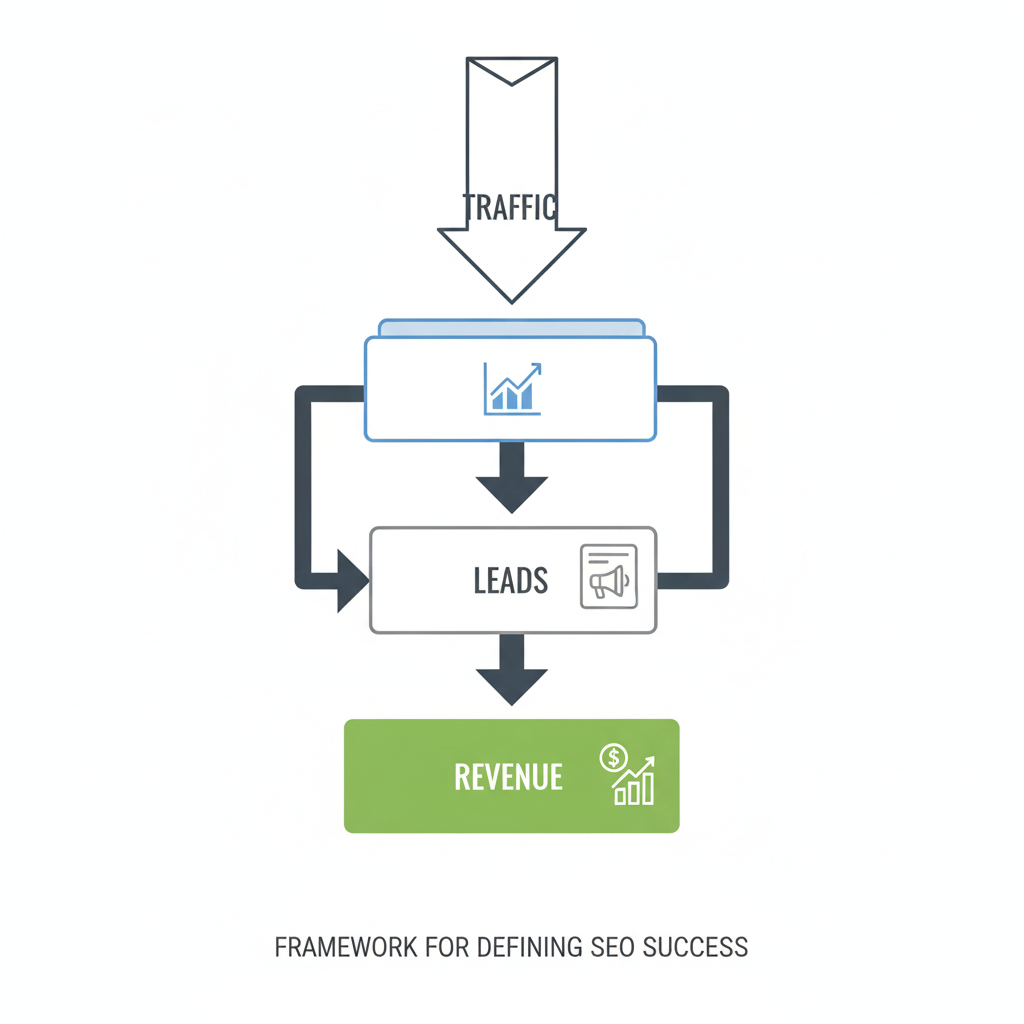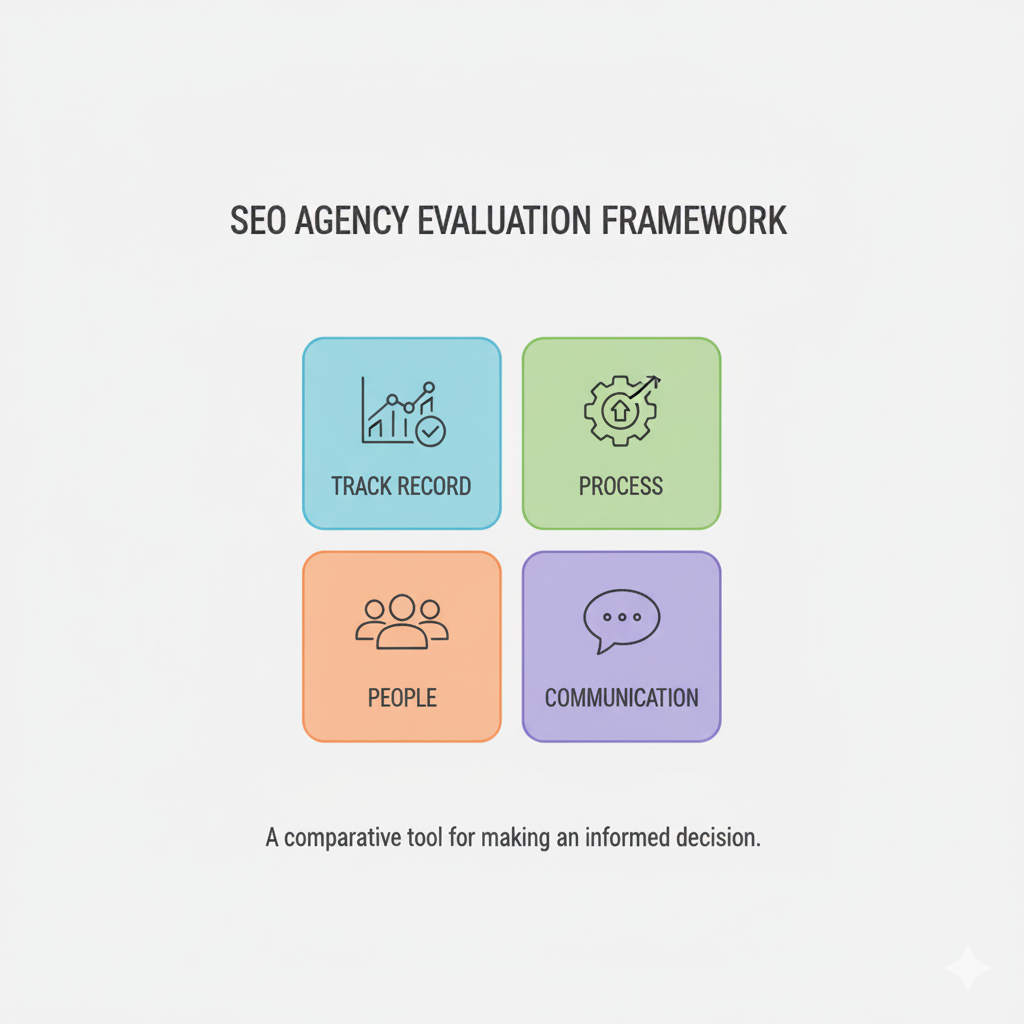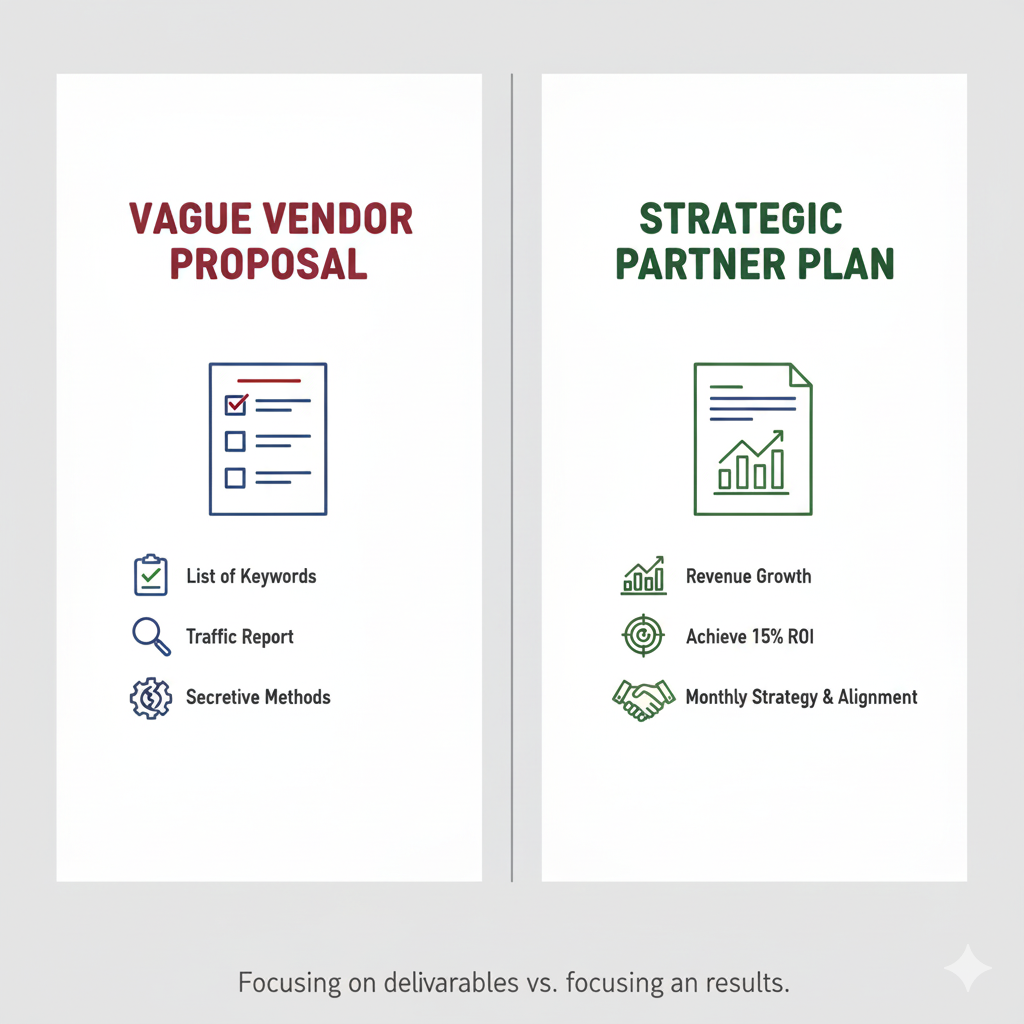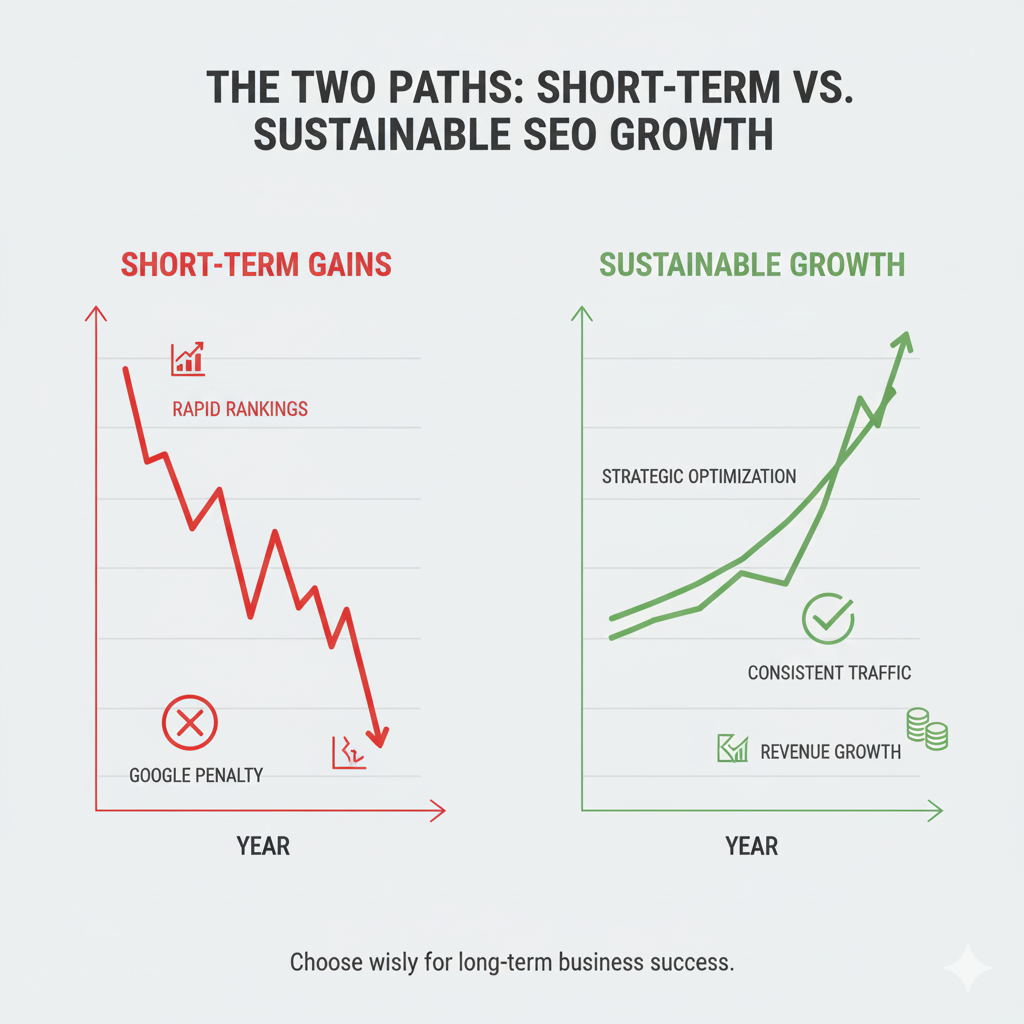
When They All Claim to Be #1
You have a dozen tabs open in your browser, each one a different SEO agency promising to get
you to the top of Google. On your desk sit three proposals, filled with technical jargon and wildly
different prices that leave you more confused than when you started. Your phone buzzes with a
follow-up call from another slick salesperson. They all sound confident, they all have flashy
presentations, and they all claim to be “the best” And you’re stuck.
This feeling—a mix of overwhelm and a deep-seated fear of making a very expensive mistake—
is where most businesses find themselves when trying to hire SEO help. You know you need it,
but the path forward is buried under an avalanche of marketing fluff, conflicting advice, and high-
pressure sales tactics. Many business owners have been burned by bad SEO experiences, leaving
them skeptical and paralyzed by the sheer number of options.
(Check SEO goals framework from Google’s guidelines)
(Check if you don’t know What is SEO)
This guide is your way out. It’s a step-by-step evaluation framework designed to help you cut
through the noise, ask the right questions, and confidently choose the right SEO partner for your
business. We’ll give you a systematic way to identify agencies with real substance and make a
decision that delivers real business impact.

How to Choose the Best SEO Agency in 2025
Step 1: Before You Search, Define What Success Looks Like for You
The single biggest mistake businesses make is jumping into sales calls without first defining their
own goals. Without a clear picture of what you want to achieve, you can’t effectively evaluate
whether an agency is the right fit.
Check How to Align Business and SEO Goals for Long-Term Success
Before you pick the best SEO agency, sit down with your team and get honest answers to these
questions:
What is our primary business goal?
Are you trying to generate more qualified leads for your service business? Increase direct sales on
your e-commerce site? Boost foot traffic to your local store? “More traffic” isn’t a goal; “20%
more qualified leads through our contact form in six months” is.
What is our budget reality?
SEO is an investment, not a magic button. Be realistic about what you can afford. A $500/month
agency and a $5,000/month agency do not provide the same service. Knowing your budget helps
you filter for partners that are the right size for your business.
What are our internal resources?
Do you have a marketing person who can collaborate with the agency? Do you have developers
to implement technical changes? Can you create content in-house, or will you need the agency to
handle it? Your capabilities determine the scope of work you need to outsource.
What does a true partner look like?
Are you looking for a team to simply execute a list of tasks, or do you need a strategic partner
who will guide your overall digital strategy?
Answering these questions first gives you a powerful filter. It immediately helps you disqualify
agencies that don’t specialize in your goals (e.g., an e-commerce specialist when you’re a local
service business) and aligns your expectations for the entire process.
Step 2: Build an Evaluation Framework That Goes Beyond Intuition
Once you have your internal goals defined, you can start building a shortlist of potential agencies.
But how do you compare them when their proposals are so different?
You need a consistent framework to evaluate what matters. This framework should focus on four
key areas: their track record, their process, their people, and their communication style.
Here are the specific, insightful questions to ask during your consultations that will reveal
whether an agency truly knows their stuff or is just repeating a sales script as one of best SEO agencies.
Questions About Their Track Record & Results:
“Can you show me a case study for a business similar to mine in industry and size?” This is
the most important question. Results in a different industry or for a massive corporation might not
be relevant to you. Look for proven results with similar businesses.
“What does success look like at 90 days, 6 months, and one year?” A good agency will set
realistic expectations. They should talk about leading indicators first (e.g., technical fixes,
improved keyword rankings) and lagging indicators later (e.g., leads and revenue).
“Can you walk me through a time when a strategy didn’t work and how you pivoted?” This
reveals their honesty and problem-solving ability. An agency that has never failed is an agency
that isn’t being truthful.
Questions About Their Process & Methodology:
- “What is your process for technical SEO, content strategy, and link building?”
Avoid agencies that give vague answers like “we use a proprietary method”. They should
be able to clearly explain their process for auditing your site, identifying content
opportunities, and earning high-quality backlinks. - “How do you stay up to date with Google’s algorithm changes?” The right answer
involves continuous learning, reading industry sources, and active participation in the
SEO community—not “we have a secret source at Google.” - “What is your philosophy on link building?” This is a critical question to sniff out
risky tactics. You want to hear answers that focus on earning links through quality
content, digital PR, and genuine outreach, not buying links or using private blog networks
(PBNs).
Questions About Their Team & Communication - “Who, specifically, will be working on my account?” Often, you’ll talk to a senior
person during the sales process, but your day-to-day contact will be a junior account
manager. Ask to meet the person who will actually be doing the work. - “What is the communication and reporting cadence?” Will you get a monthly report,
or will you have weekly calls? What metrics are included in their reports? Ensure their
communication style matches your needs. - “How do you integrate with our internal team?” If you have in-house writers or
developers, the agency needs to function as a collaborative partner, not a silo. Ask how
they manage that workflow. - These questions force agencies to move beyond their polished pitch and show you the real
substance—or lack thereof—behind their claims as one of best SEO agencies.
Step 3: Learn to Spot the Red Flags (The Obvious and the Subtle)

Building trust is a core part of this process, and a huge part of that is protecting yourself from bad
actors. Some warning signs are easy to spot, while others are more subtle. Here is a
comprehensive checklist of red flags to watch out for.
The Blatant, Run-for-the-Hills Red Flags:
- Guarantees of #1 Rankings: No one can guarantee specific rankings on Google, period.
The algorithm is too complex and constantly changing. This is the oldest and most
dangerous sales pitch in the book. - “Secret” or “Proprietary” Methods: An agency that isn’t transparent about its process
is an agency with something to hide16
. Quality SEO is based on well-known principles,
not a secret sauce. - A Focus on Quantity of Links: If an agency boasts about getting you “50 links per
month,” run. Modern, effective SEO is about the quality and relevance of links, not the
sheer number. Low-quality links can get your site penalized. - Unclear or Vague Pricing: If you can’t get a straight answer on what you’re paying for
and what deliverables are included, it’s a major red flag.
The More Subtle (But Equally Dangerous) Red Flags: - Lack of Specificity: If you ask about their process and get a lot of marketing buzzwords
like “we leverage synergies to optimize your digital presence,” they probably don’t have a
real process. A good partner uses clear, direct language. - No Questions for You: A great agency will interview you just as much as you interview
them. They should be deeply curious about your business, your goals, your customers,
and your past marketing efforts. If they don’t ask questions, they’re selling a one-size-fits-
all package, not a custom strategy. - The “Bait and Switch” Team: You have a great conversation with a seasoned expert
during the sales process, but once you sign the contract, you’re handed off to an
inexperienced junior employee. Insist on knowing who your day-to-day contact will be
before you sign. - An Outdated Website or Poor SEO on Their Own Site: If an agency can’t rank its own
website or its site is full of errors, how can you trust them to manage yours? Practice
what you preach is a fundamental sign of competence. - Reluctance to Share Access or Data: Any agency that doesn’t provide full access to
your Google Analytics, Google Search Console, and their reporting dashboard is not a
transparent partner. It’s your data, and you should always have full ownership and access.
Trust your gut. If a conversation feels more like a high-pressure sales pitch than a collaborative
strategy session, it’s probably not the right fit.

Step 4: Putting It All Together for a Confident Decision
After you’ve interviewed a few agencies and vetted them for red flags, it’s time to decide. To do
this objectively, avoid just going with the one you “liked the best.” Instead, use a simple
framework to compare them side-by-side.
Create a simple scorecard and rate each agency on a scale of 1-5 in these key areas:
- Industry Relevance & Case Studies: How well do their past results align with your
specific business needs? - Strategic Depth: Did they present a custom strategy or a generic package? How deeply
did they seem to understand your business after your conversation? - Process Transparency: How clearly did they explain their methodology for technical
SEO, content, and link building? - Team Expertise: How confident are you in the specific people who will be working on
your account? - Communication & Cultural Fit: Do you feel they would be a collaborative, easy-to-
work-with partner?
This simple exercise removes emotion and gut feelings from the equation, helping you make a
logical choice based on what truly matters for your business.
A Note on Practical Concerns
Local vs. Remote:
Don’t get too hung up on finding a “local SEO agency.” The best SEO
talent might not be in your city. Focus on finding an agency with the best experience in
your industry, regardless of location.
Reference Checking:
When you check references, don’t just ask “Were you happy with
them?”. Ask specific questions like, “What was the biggest challenge they helped you
overcome?” and “How was their communication when things weren’t going as planned?”
Proposals:
A good proposal is a reflection of a good strategy. It should be customized to
your goals, not a cookie-cutter template23. It should clearly outline deliverables,
timelines, and costs.
The Proposal Showdown: What Good vs. Bad Looks Like on Paper
You’ve done the interviews, and the final proposals have arrived. This is where decision
paralysis often kicks in, because two proposals for the same service can look completely
different. Let’s break down the anatomy of a “Vague Vendor” proposal versus a
“Strategic Partner” proposal to help you see beyond the surface.
Check Anchor text suggestion: “SEO proposal template from Ahrefs.”
Check Semrush – How to Write an SEO Proposal
Imagine you’re a B2B software company whose goal is to increase qualified demo
requests.
Proposal A: The Vague Vendor
This proposal is essentially a menu of services. It’s heavy on deliverables but light on
strategy.
Objective: “Increase website traffic and rankings.”
Monthly Deliverables:
o “Keyword research for 500 keywords.”
o “4 blog posts per month (1,000 words each).”
o “20 high-DA backlinks.”
o “On-page optimization for 10 pages.”
Reporting: Monthly report showing keyword ranking changes and overall traffic.
Price: $1,500/month.6
Why This is a Red Flag:
This proposal sells a list of activities, not a strategy for
achieving outcomes. There’s no connection between writing four random blog posts and
your goal of getting more demo requests. The promise of “20 high-DA backlinks” is a
classic sign of a low-quality link-building scheme that could get your site penalized. It’s a
generic, one-size-fits-all package that hasn’t been tailored to your business.
Proposal B: The Strategic Partner
This proposal starts with your business goals and builds a custom plan to reach them.
Objective: “Increase qualified demo requests from organic search by 25% in 12
months.”
Q1 Strategy & Focus:
Phase 1 (Month 1): Complete a comprehensive technical audit to fix
crawling and indexing issues that are hurting your current performance.
Establish baseline metrics for conversion tracking.
Phase 2 (Month 2-3): Develop a content strategy around the
“Problem/Solution” topic cluster. We’ve identified that your target
customers are searching for solutions to [X problem], and your software is
the answer. The goal is to capture this high-intent traffic.
Key Deliverables (to support the strategy):
o Production of one in-depth, authoritative guide and three supporting
articles for the primary topic cluster.
o Earning 3-5 high-quality backlinks from relevant industry publications by
promoting our new guide.
Reporting: Monthly performance report focused on organic traffic to key
commercial pages, keyword rankings for high-intent terms, and the number of
qualified demo requests generated.
Price: $4,000/month.
The Clear Difference:
The Strategic Partner’s proposal costs more, but it’s infinitely
more valuable. Every activity is tied directly to the business goal. They aren’t just
creating content; they are creating the right content to attract the right audience. They
aren’t just building links; they are earning authoritative links that build trust. You’re not
buying a list of tasks; you are investing in a business growth strategy.

A Tale of Two Investments: The Real Cost of a Bad SEO Hire
Your fear of making an expensive mistake is valid. But the biggest mistake isn’t always
choosing the most expensive agency—it’s choosing the wrong one. Let’s follow the story
of two similar business owners, Sarah and Tom, to see how this choice plays out over a
year.
The Setup: Sarah and Tom both run online stores selling high-end pet supplies. They
have similar revenue and similar goals: to grow their organic sales.
Sarah Hires the “Bargain” Agency Sarah chooses an agency that promises fast results
for a low price. They guarantee first-page rankings and a huge number of backlinks every
month.
Months 1-3: Sarah is thrilled. The agency sends her reports filled with vanity
metrics. Her site is suddenly ranking for hundreds of long, obscure keywords
she’s never heard of. Her backlink profile explodes with links from foreign-
language forums and generic directories.
Months 4-6: A nagging feeling sets in. Website traffic is up, but her sales are
completely flat. She digs into her analytics and realizes the new traffic isn’t from
people who actually want to buy pet supplies. The visitors bounce immediately.
The “results” are meaningless.
Month 9: Disaster strikes. She gets an email from Google about a “manual
action” due to unnatural linking patterns. Her website’s rankings evaporate
overnight, even for her brand name. The “bargain” agency has destroyed her site’s
reputation with Google.
The Aftermath: Sarah has to fire the agency and hire a new, reputable expert just
to clean up the mess and try to get the penalty removed. The “bargain” hire cost
her a year of lost growth, her site’s visibility, and thousands of dollars in recovery
work. She is in a far worse position than when she started.
Tom Hires the “Strategic Partner” Tom chooses a more expensive agency that made
no guarantees but presented a clear, foundational strategy.
Months 1-3: Progress feels slow. The agency isn’t building many links yet.
Instead, they’re working with Tom’s developer to fix technical issues with the
site’s structure and speed. They are doing deep research on what his customers
actually search for. Tom is a bit nervous, but the agency’s communication is
crystal clear, explaining that they are building a strong foundation for long-term
growth.
Months 4-6: The foundational work starts to pay off. Tom’s store begins ranking
on page one for valuable, buyer-intent keywords like “best orthopedic dog bed”
and “organic cat food.” Organic traffic is climbing steadily, and more importantly,
his sales from organic search see a significant lift.
Month 9: Organic search is now Tom’s most profitable and reliable marketing
channel. The agency has earned him features on popular pet blogs, which not only
provide powerful backlinks but also drive direct referral traffic and sales.
The Aftermath: Tom’s investment has compounded. His website is now a
valuable business asset that consistently generates revenue. The strategic partner
didn’t just get him rankings; they helped him build a more sustainable and
profitable business.
This story illustrates the most important lesson in choosing an SEO agency: good SEO is
an investment that builds a compounding asset over time. Bad SEO is a liability that
leaves you with a toxic mess to clean up. The choice you make isn’t just a marketing
decision; it’s a business-critical one.

Frequently Asked Questions (FAQ)
How many SEO agencies should I evaluate?
A good approach is to build an initial list of 5-7 agencies, conduct screening calls with 3-4, and
request proposals from your top 2-3 finalists27. This is enough to get a good comparison without
leading to decision fatigue.
How long does it really take to see results from SEO?
Be skeptical of anyone who promises immediate results. While you might see some positive
movement from technical fixes in the first 1-3 months, it typically takes 6-12 months of
consistent effort to see a significant, measurable impact on your business goals like leads and
revenue.
Is a local SEO agency better than a remote one?
Not necessarily. The most important factor is an agency’s expertise and track record in your
specific industry or business model. A remote agency with deep experience in e-commerce SEO
will almost always be a better choice for an online store than a local agency that primarily works
with dentists. Choose expertise over geography.
What should I look for in an SEO agency’s contract?
Look for clear terms on the scope of work, the length of the engagement (avoid long-term lock-
ins initially), ownership of data (you should own all your accounts and content), and a clear
termination clause that outlines what happens if you part ways.
How do I measure the ROI of my SEO investment?
A good agency will work with you to define key performance indicators (KPIs) that tie directly to
your business goals. This goes beyond just tracking traffic. It means tracking contact form
submissions, phone calls from search, online sales, and ultimately, the revenue generated from
the organic search channel.
Choosing the best SEO agency isn’t about finding the cheapest option or the one with the flashiest
sales pitch. It’s about finding a true partner—a team that invests in understanding your business,
communicates transparently, and has the proven expertise to deliver results. By using this
framework, you can move past the hype, ask the questions that matter, and make a confident
decision that will become a powerful engine for your business’s growth.
Comments